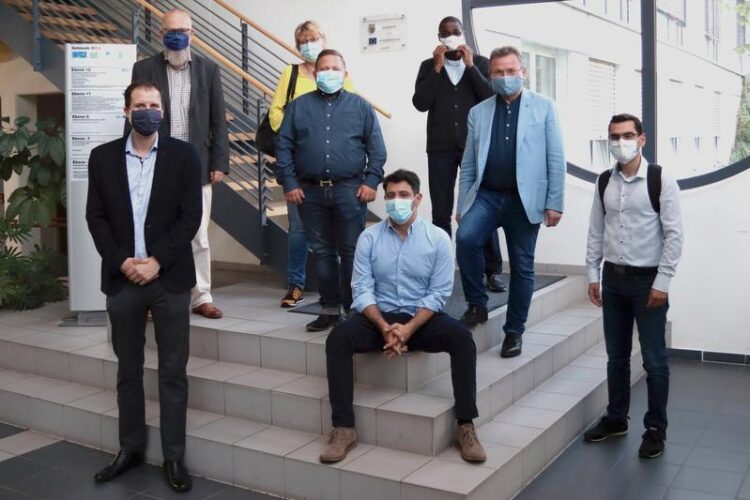AI method to recognize quality of donor corneas

Project Kick-off on 25 August 2020
DFKI
Project “KItatta” launched
In Germany, more than 9,000 corneal transplantations are performed annually. Despite strict quality criteria, about 4-5% of the transplants show postoperative wart-like changes that impair the cornea’s functionality. So far, it cannot be excluded with certainty whether and to what extent the so-called guttae are present.
This can lead to the transplantation of pathologically changed corneas. In a joint project, the Saarland University Clinic for Ophthalmology and DFKI want to develop a method to better assess the quality of donor corneas.
Guttae can occur on the basement membrane of the cornea, which carries endothelial cells. Endothelial cells are located on the back surface of the cornea and are responsible for actively pumping out fluid and maintaining the cornea’s transparency. In the presence of many guttae, the endothelial cells lose their function and cannot hold the cornea’s transparency in the long run. This often leads to irreversible visual impairment, sometimes so severe that a new cornea’s transplantation becomes necessary. Guttae sometimes remain undetected in the preoperative routine inverted mirror microscopy.
The goal of KIttata (Artificial Intelligence for the Detection and Classification of the Corneal Guttata in the Corneal Bank prior to Keratoplasty) is to develop an AI classification algorithm that predicts the transplantation suitability of a donor cornea. This is intended to increase the long-term survival rate of corneal transplants, reduce the need for retransplantation, and reduce the associated health care costs.
The probability of the existence of undetected guttae in a corneal graft depends on morphological criteria such as differences in cell color, irregularities in cell shape, presence of vesicles, deformities of the cell membrane, or presence of areas without cells.
“While our Ph.D. student Tarek Safi was establishing morphological criteria for the detection of masked guttae on the donor cornea in the corneal bank, he came up with the idea of using artificial intelligence for the detection of alarming structural abnormalities. AI is currently finding many applications in many areas of medicine, including ophthalmology. By using this advanced technology as image analysis and recognition tool, a milestone in the quality assurance of corneal donor tissue could be achieved,” explains Prof. Dr. Berthold Seitz, Director of the Department of Ophthalmology at Saarland University Hospital.
Scientists from the DFKI research area Cognitive Assistants use AI methods to develop procedures that implement these criteria. This is essentially a classification algorithm that uses the parameters resulting from the operations to predict whether a given donor cornea is healthy. They use microscopically acquired image data of the corneas, which represent these details, as input parameters for an AI-supported evaluation algorithm (classifier).
“Our goal is to optimize the classification of corneas and achieve more accurate results than the methods used so far. To achieve this, we use a deep learning method, i.e., machine learning algorithms based on complex neural networks. For this purpose, neural models are created that are derived from information from the corneal bank, i.e., images and parameters,” says DFKI project manager Dr. Jan Alexandersson.
Finally, the results are evaluated by a clinical expert. This assessment serves as a basis for adjusting the models’ input parameters and helps to optimize the model step by step.
Sponsor: Dr. Rolf M. Schwiete Foundation, Mannheim
Volume: approx. 215,000 €.
Duration: 1 year
Partner: German Research Center for Artificial Intelligence – DFKI, Saarbrücken
Saarland University Hospital – Department of Ophthalmology, Homburg
Press Contact Saarland University Hospital (UKS)
Roger Motsch
Press Office Saarland University Hospital
E-Mail: Roger.Motsch@uks.eu
Tel.: +49 6841 1622083
Press contact DFKI
Heike Leonhard
Team Corporate Communications DFKI Saarbrücken
E-Mail: heike.leonhard@dfki.de
Tel.: +49 174 3076888
Wissenschaftliche Ansprechpartner:
Prof. Dr. Berthold Seitz
Clinic Director
Department of Ophthalmology at Saarland University Hospital.
E-Mail: berthold.seitz@uks.eu
Tel.: +49 6841 1622 387
Dr. Jan Alexandersson
German Research Center for Artificial Intelligence
Research Department Cognitive Assistants
E-Mail: Jan.Alexandersson@dfki.de
Tel.: +49 681 85775 5347
Weitere Informationen:
Media Contact
All latest news from the category: Information Technology
Here you can find a summary of innovations in the fields of information and data processing and up-to-date developments on IT equipment and hardware.
This area covers topics such as IT services, IT architectures, IT management and telecommunications.
Newest articles

You are What You Eat—Stanford Study Links Fiber to Anti-Cancer Gene Modulation
The Fiber Gap: A Growing Concern in American Diets Fiber is well known to be an important part of a healthy diet, yet less than 10% of Americans eat the minimum recommended…

Trust Your Gut—RNA-Protein Discovery for Better Immunity
HIRI researchers uncover control mechanisms of polysaccharide utilization in Bacteroides thetaiotaomicron. Researchers at the Helmholtz Institute for RNA-based Infection Research (HIRI) and the Julius-Maximilians-Universität (JMU) in Würzburg have identified a…

ASXL1 Mutation: The Hidden Trigger Behind Blood Cancers and Inflammation
Scientists show how a mutated gene harms red and white blood cells. LA JOLLA, CA—Scientists at La Jolla Institute for Immunology (LJI) have discovered how a mutated gene kicks off…



